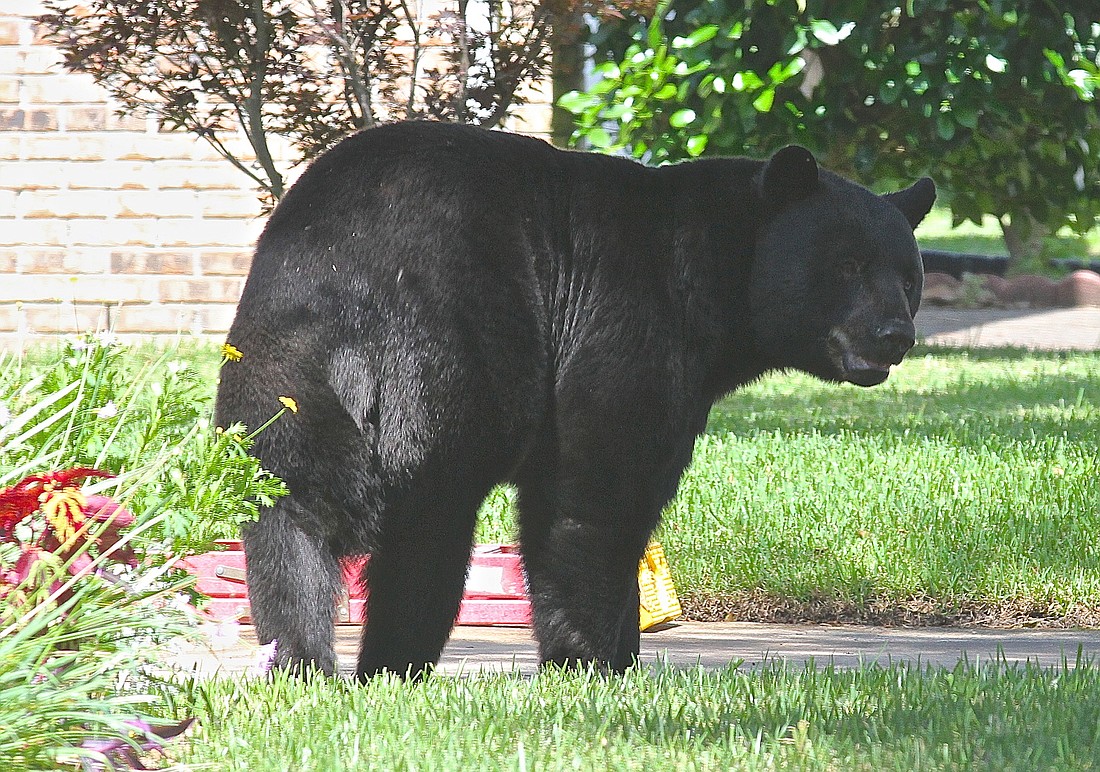- April 25, 2024
-
-
Loading

Loading

Days after Winter Garden residents spotted a Florida black bear scavenging for food in their neighborhood, officials from the Florida Fish and Wildlife Conservation Commission caught the animal.
Residents spotted the bear Aug. 6 in an east Winter Garden neighborhood near East Bay and Christopher streets. Annie Collins snapped a photo of the hungry bear, which she later posted on Facebook. And although Collins would prefer her neighborhood to be bear-free, she understands it’s part of living in a high-growth community.
“This bear has been pushed out,” Collins said. “I’m sure if it hadn’t been for all this construction of these homes, the hospital grounds way back toward Apopka, the expansion of the toll roads, this bear would probably have somewhere to go, but it’s being pushed out. … That’s the only reason I called FWC, it’s because I don’t want that bear to become (accustomed) to people to where they have to do something to it or it attacks somebody and you have to kill it.”
Because of the bear sighting, many residents did not allow their children to play outside until it had been caught and removed. Collins’ own 79-year-old neighbor had food she had been growing in her garden go missing.
“It’s just hungry,” Collins said. “Where’s their food? You’ve pushed down the trees; you’ve pushed down the berries; there’s now nothing. It ate all of my neighbor’s fruit and vegetables. She had a garden over in that house.”
After catching the bear Friday, Aug. 12, FWC officials now are relocating it to Ocala National Forest, the nearest appropriate bear habitat, said FWC spokeswoman Carli Segelson.
West Orange resident Don Kendzior, a certified Florida master naturalist and the president of Noah’s Notes, a local nonprofit environmental organization that advocates for nature and wildlife conservation, said he suspects development is the reason why the bear strayed into a residential area.
“It possibly could have been living in a natural area that was destroyed by development forcing it out to find a new home,” Kendzior said. “Wildlife will often follow undisturbed corridors, especially waterways, rail or utility lines, to move between habitats in urban and suburban areas.”
However, Jim Bronzo, founder of Second Chance Wildlife Sanctuary, holds a slightly different theory. He doesn’t completely discredit development as the main reason, but he said bears are smart and that they likely remember the traumatic events from the controversial bear hunt in 2015.
“Since that bear hunt, bears have shown up in places that they never were before,” Bronzo said. “These new bears are doing exactly what we told FWC was going to happen. The hunters went deep into the woods, where they’re eating their strawberries, not messing with anybody. … That’s what this bear was, this Winter Garden bear.”
The Winter Garden bear caused unease among residents, who were fearful for their children, considering several walk to school or bus stops. Taylor Clark, the education and wildlife coordinator at Oakland Nature Preserve, conducted research in the Smoky Mountains where residents peacefully live alongside bears. Clark believes residents’ panic can be reduced with a little education.
“It comes as a shock because I don’t think people understand bear psychology, so they’re really intimidated by bears,” Clark said. “People think that they’re meat eaters, and they’re going to come after them and eat them. But I think when people understand more about bears and their biology, they’ll understand they’re just looking for an easy handout.”
Clark suggests residents consider buying special locks for their garbage bins. For municipalities interested in buying bear-resistant trash cans, the FWC is offering grants that can be applied for by any governing body.
“The worst attractant to bears is household garbage,” said FWC officer Greg Workman. “Be very careful of when you put your garbage out. … Putting it out early could be almost like ringing a dinner bell to wildlife. So try to not put it out the night before.”
Workman advises all residents in a neighborhood to cooperate to deter bears from coming because even one person who doesn’t comply can lure a bear to the neighborhood. Workman also offers the tip of using whistles or airhorns to drive a bear out of an area.
“They’re gentle animals, and they get scared,” Bronzo said. “They eat berries. They’re not meat eaters. And the people just freak out, and I keep seeing all these things on the news. … it’s unbelievable. You’d think it was Bigfoot or something, I mean, there’s bears everywhere.”
_
Contact Gabby Baquero at [email protected].